|
Monday, 19 September
|
|
Opening Session
|
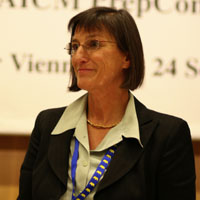
The President of SAICM PrepCom-3, Viveka Bohn (Sweden), urged delegates
to finish negotiations this week, and to use this opportunity to make a
difference for the world of their children and grandchildren.
|
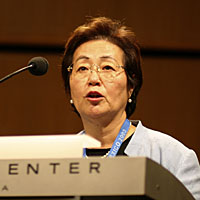
Speaking on behalf of the UNIDO Director-General, Haruko Hirose
highlighted the integration of chemicals issues in UNIDO programmes, in
particular those on policies and regulations, institutions and sectoral
capacity building, and multilateral conventions.
|
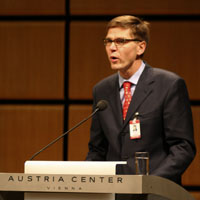
Werner Wutscher, Secretary-General, Austria's Federal Ministry of
Agriculture, Forestry, Environment and Water Management stressed it was
essential that a global managing system for chemicals be led by
precaution and prevention, and noted the SAICM's role in complying
with a new paradigm of chemicals policy.
|
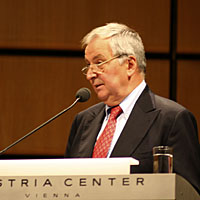
UNEP Executive Director Klaus Töpfer noted that heads of state at the
recently-completed 2005 World Summit had agreed to promote the sound
management of chemical and hazardous wastes throughout their life cycle
by adopting and implementing a voluntary SAICM.
|

Suwit Wibulpolprasert, Intergovernmental Forum on Chemical Safety (IFCS)
President, stressed the need to improve the inclusiveness and
participatory nature of the SAICM.
|
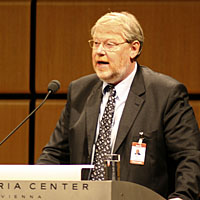
Robert Visser, Chair of the Inter-Organization Programme on the Sound
Management of Chemicals (IOMC), emphasized that priority-setting and
coordination in the implementation of SAICM are critical, and called for
national governments to act in a coordinated way.
|
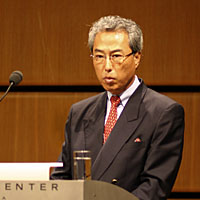
Shoji Nishimoto, Assistant Administrator and Director of Bureau for
Development Policy, United Nations Development Programme (UNDP),
stressed that efforts required for the implementation of SAICM should be
strongly linked to initiatives underway to meet the Millennium
Development Goals (MDGs).
|

Marcel Boisard, Executive Director of the United Nations Institute for
Training and Research (UNITAR), pointed to UNITAR's participation in
the implementation of SAICM through training, capacity building for
governments, NGOs and disadvantaged groups, and the development of
methodologies and guidance documents for chemicals management.
|

Mario Molina, recipient of the 1995 Nobel Prize in Chemistry for research
on chlorofluorocarbons (CFCs), explained how international agreements
and scientific cooperation helped engage industry and develop innovative
replacements.
|
|
Preparatory Committee
|
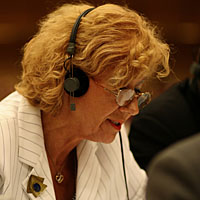
Ivana Halle of Croatia, speaking on behalf of the Central and Eastern
European Group, said the three documents reflected the discussion
of the region and provided a good basis for discussion.
|
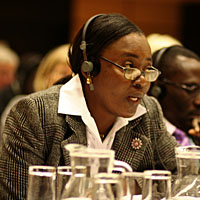
Speaking on behalf of the African Group, Abiola Olanipekun of Nigeria
stressed the need to develop a sustainable financial mechanism for SAICM.
|
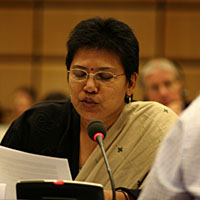
Sarojeni Rengam of the Pesticide Action Network suggested focusing on
vulnerable people and on risk reduction, and urged more people-centered
agriculture.
|
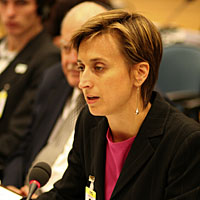
Estefania Blount of ICFTU urged implementation of WSSD goals, particularly
with regard to risk assessment and minimizing chemical exposure of workers
and children.
|
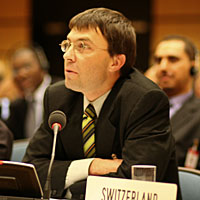
Franz Perrez of Switzerland said that concrete measures contained in the
Global Plan of Action are toolkits for the implementation of SAICM and
should not be further negotiated during this meeting.
|
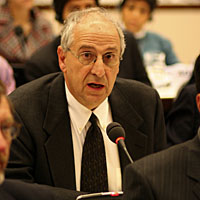
Jack Weinberg of the International POPs Elimination Network appealed to
donor countries for providing substantial funding for SAICM and proposed
phase-outs of dangerous chemicals and substitution for chemicals that may
pose unmanageable risks.
|
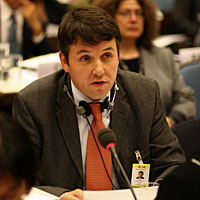
John Atherton of the International Council on Mining and Metals noted
the contribution of chemicals to poverty eradication and sustainable
development, which has an economic and social, and not just an
environmental, dimension.
|
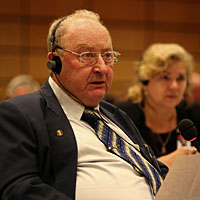
Boris Kurlyandskiy of Russia said that without incentives for better
chemicals management, countries with economies in transition and developing
countries could be further disadvantaged in their economic development.
|
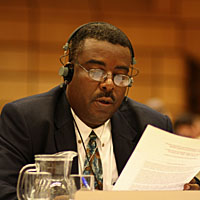
Alain Louis of Haiti called for an inter-sectoral approach with increased
funding, and called on countries to ratify chemicals related conventions.
|
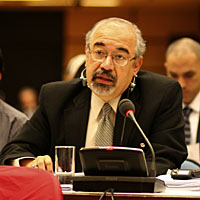
Daniel Chacón Anaya of Mexico, speaking on behalf of GRULAC, said
that the SAICM process should contribute to meeting the MDGs.
|
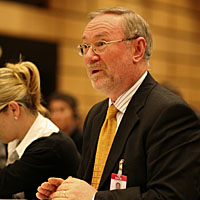
Mark Hyman of Australia, speaking on behalf of JUSSCANNZ and the EU,
clarified that delegations within the group had different views on
specific concrete measures.
|
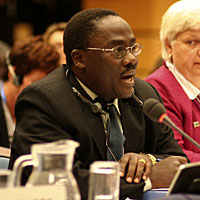
Jamidu Katima of Tanzania will chair the contact group to discuss the
draft global plan of action.
|
|
Ozone Seminar
|

On the occasion of the 20th Anniversary of the Vienna Convention on the
Protection of the Ozone Layer, the UNEP Ozone Secretariat held a side
event on the lessons from the Vienna Convention that are applicable to
the chemicals. The seminar highlighted the principles, role of science,
process, and institutional set-up that were key to making the Vienna
Convention a success.
|

